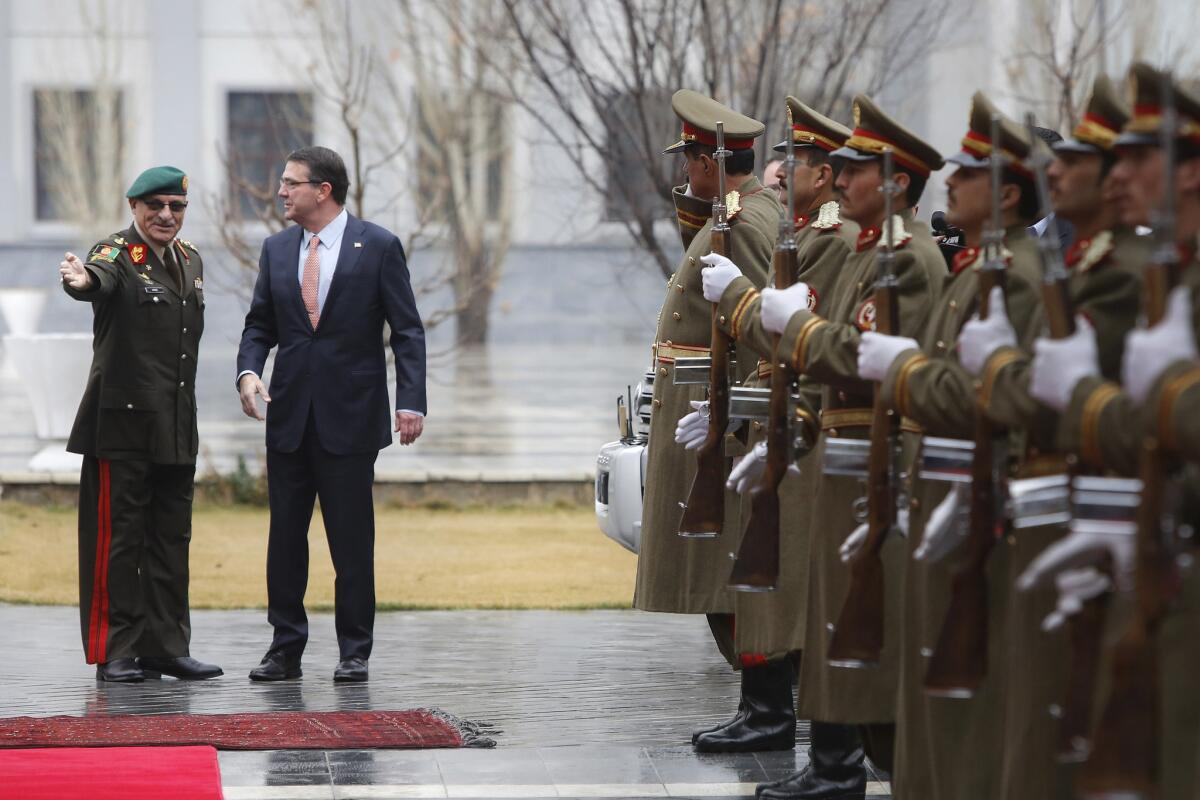New U.S. Defense chief hints at slower troop drawdown in Afghanistan

- Share via
reporting from Kabul, Afghanistan — Ashton Carter, the new U.S. secretary of Defense, indicated Saturday that he may advise President Obama to consider slowing the drawdown of American troops from Afghanistan due in part to a stronger relationship with the country’s new unity government.
Speaking at a joint news conference with Ashraf Ghani, the Afghan president, Carter said any reassessment would reflect the “reality on the ground.”
The new Pentagon chief, sworn in Tuesday, said a final decision on the withdrawal of the 10,000 remaining U.S. troops would be made by Obama and Ghani during the Afghan president’s visit to Washington next month.
Carter said the U.S. priority was to ensure that progress continues. “That’s why,” he said, there could be “possible changes to the timeline for our drawdown of U.S. troops.”
One major sign of confidence for Washington, Carter said, was Afghanistan’s government.
Based on an agreement brokered by U.S. Secretary of State John F. Kerry and the United Nations, the Afghan unity government sought to bring an end to a nearly yearlong election cycle, marred by allegations of widespread government-assisted fraud, by creating the new position of chief executive for Abdullah Abdullah, Ghani’s main election rival.
Carter characterized the new government as a “major change ... that just a few months ago we couldn’t have planned on.”
Coming after years of icy relations with Hamid Karzai, the former Afghan president, Washington hopes that the Ghani administration will be more receptive to greater cooperation.
The unannounced two-day visit is Carter’s first trip abroad as Defense secretary. He was also expected to meet with U.S. troops and commanders, whose mission changed in January to focus on counter-terrorism operations and training Afghan soldiers and police.
Carter’s visit comes as the Ghani administration looks for ways to begin negotiations with Taliban insurgents. Recent news reports have suggested that the group is ready to restart talks with the government, possibly also involving the United States, in the Persian Gulf nation of Qatar.
Addressing the prospects of negotiations, Ghani would say only, “Grounds for peace have never been better in the last 36 years.… The direction is positive, but we can’t make premature announcements.”
A post on Ghani’s official Twitter account also alluded to the prospect of peace talks.
“We have initiated a comprehensive effort for establishing lasting peace in Afghanistan. The process will be inclusive and fully transparent,” the tweet read.
The Taliban denied such reports, calling them “baseless” in a statement Friday.
“Afghanistan is still under occupation, there are thousands of foreign troops currently present and operating inside Afghanistan, the Kabul administration has a security pact with America,” the statement read.
U.S. officials said they had no plans to meet with the Taliban in Qatar.
U.S. and European officials reached out secretly to Taliban emissaries before 2013, when the militant group briefly opened a diplomatic office in the Qatari capital of Doha in what was seen as a step toward formal peace talks. But those plans were scrapped that summer after Karzai, angry about being left out of the meetings, lashed out at the Taliban for raising a flag symbolizing the Islamic Emirate of Afghanistan, as the group called itself, outside the Doha office.
Washington and the Taliban have since held limited talks, which came to light in May after five members of the insurgent group were released from U.S. captivity at Guantanamo Bay, Cuba, in exchange for U.S. prisoner of war Sgt. Bowe Bergdahl.
Latifi is a special correspondent.
More to Read
Sign up for Essential California
The most important California stories and recommendations in your inbox every morning.
You may occasionally receive promotional content from the Los Angeles Times.










